Genesis 16 meaning explained in AI Summary
Sarai, being barren, gives her maidservant, Hagar, to Abram as a concubine. Hagar conceives and bears a son named Ishmael. However, Sarai becomes jealous of Hagar and treats her harshly, causing Hagar to flee into the wilderness. An angel of God appears to Hagar and promises that Ishmael will become a great nation.
This chapter tells the story of Hagar, Sarai's Egyptian maidservant, and the birth of Ishmael.
The Problem of Infertility:
- Abram and Sarai are still childless after ten years in Canaan.
- Sarai, desperate for a child and following the custom of the time, offers her maidservant Hagar to Abram as a wife to bear him an heir.
Hagar and Sarai:
- Abram agrees to Sarai's plan, and Hagar becomes pregnant.
- Hagar, feeling superior due to her pregnancy, begins to despise Sarai.
- Sarai, feeling betrayed and humiliated, mistreats Hagar.
- Unable to bear the mistreatment, Hagar flees into the wilderness.
The Angel of the Lord and Hagar:
- In the wilderness, the Angel of the Lord appears to Hagar.
- He tells her to return to Sarai and submit to her authority.
- He promises Hagar that her descendants will be too numerous to count.
- He tells her she will bear a son and name him Ishmael, meaning "God hears," because God has heard her misery.
The Birth of Ishmael:
- Hagar returns to Abram and Sarai and gives birth to Ishmael.
Significance:
- This chapter highlights the consequences of human impatience and flawed solutions.
- It introduces the complex relationship between Sarai and Hagar, setting the stage for future conflict between their descendants.
- It marks the birth of Ishmael, a significant figure in Abrahamic religions, considered the ancestor of the Arab people.
- It demonstrates God's compassion and intervention, even in the midst of difficult situations.
Genesis 16 bible study ai commentary
This chapter chronicles the painful consequences of human impatience in attempting to fulfill God's promise. Sarai and Abram, doubting God's timing, turn to a culturally acceptable but faithless solution—surrogacy through Hagar. The resulting domestic conflict, jealousy, and abuse leads to Hagar's flight. However, the story pivots to reveal God's profound compassion, as He seeks out the rejected Hagar, names her son, promises her a future, and reveals Himself by a new name, "The God Who Sees," demonstrating that His care extends even to those outside the immediate covenant line who are afflicted.
Genesis 16 context
This story is set in the Ancient Near East, where infertility was a source of great social shame and seen as a divine curse. Legal customs of the time, evidenced in documents like the Code of Hammurabi and Nuzi tablets, allowed for a barren wife to give her handmaid to her husband to produce an heir. This child would legally be considered the child of the first wife. Sarai’s plan, while a lapse in faith in God's specific promise, was a culturally logical and legally sanctioned course of action. The chapter serves as a stark contrast between human schemes rooted in cultural norms and God's sovereign, miraculous plan.
Genesis 16:1
Now Sarai, Abram’s wife, had borne him no children. She had a female Egyptian servant whose name was Hagar.
In-depth-analysis
- Sarai... had borne him no children: The narrative re-establishes the core problem introduced in Genesis 11:30. The promise of offspring (Gen 12:2, 15:4-5) remains unfulfilled.
- Egyptian servant: Hagar's nationality is significant. Abram and Sarai acquired servants in Egypt (Gen 12:16) during an episode of compromised faith. Hagar is a living reminder of that failure, which is now central to their next failure of faith.
- Hagar: Her name's meaning is uncertain, but some scholars link it to a Hebrew root meaning "to flee," foreshadowing her action in verse 6.
Bible references
- Genesis 11:30: 'But Sarai was barren; she had no child.' (The foundational problem)
- Genesis 15:2-3: 'But Abram said, "O Lord GOD, what will you give me, for I continue childless..." Behold, you have given me no offspring...' (Abram's explicit complaint to God)
- Genesis 12:16: 'And for her sake he dealt well with Abram; and he had sheep, oxen... and male and female servants.' (The source of Hagar)
Cross references
1 Sam 1:5-6 (barrenness and rivalry); Luke 1:7 (Elizabeth's barrenness)
Genesis 16:2
And Sarai said to Abram, “Behold now, the LORD has prevented me from bearing children. Go in to my servant; it may be that I shall obtain children by her.” And Abram listened to the voice of Sarai.
In-depth-analysis
- The LORD has prevented me: Sarai correctly identifies God's sovereignty over the womb but draws the wrong conclusion. She sees it as a permanent barrier, not a test of faith.
- Obtain children by her: The Hebrew is 'ibbaneh, literally "I will be built up" or "be-sonned." A family was "built" by having sons. This was her attempt to build her own house, rather than waiting for God to build it.
- Abram listened to the voice of Sarai: This phrase is a stark and deliberate echo of Genesis 3:17, where Adam "listened to the voice of your wife" and ate the forbidden fruit. In both cases, a husband's passivity and deference to his wife's flawed, faithless plan leads to disaster.
Bible references
- Genesis 3:17: 'And to Adam he said, "Because you have listened to the voice of your wife and have eaten of the tree..."' (The "Fall" parallel)
- Proverbs 3:5-6: 'Trust in the LORD with all your heart, and do not lean on your own understanding.' (The principle violated by Abram and Sarai)
- Genesis 30:1-3: '...Rachel said to Jacob, "Give me children, or I shall die!" ...she said, "Here is my servant Bilhah; go in to her, that she may bear on my knees and that I too may have children through her."' (Demonstrates this was a recurring practice)
Cross references
Gen 15:4 (God's specific promise of Abram's own son); Psa 127:1 (Unless the LORD builds the house); Isa 55:8-9 (God's ways higher than man's)
Genesis 16:3
So, after Abram had lived ten years in the land of Canaan, Sarai, Abram’s wife, took Hagar the Egyptian, her servant, and gave her to Abram her husband as a wife.
In-depth-analysis
- Ten years in the land of Canaan: This chronological note is crucial. It highlights the long, frustrating period of waiting. Their patience has worn thin. God's promises often require endurance.
- Gave her to Abram... as a wife: This was a legal transaction, making Hagar a secondary wife or concubine, with specific rights and purposes. This formalizes the human solution.
Bible references
- Genesis 12:4: 'So Abram went, as the LORD had told him... Abram was seventy-five years old when he departed from Haran.' (The starting point of the ten-year clock)
- Hebrews 6:12: '...so that you may not be sluggish, but imitators of those who through faith and patience inherit the promises.' (Highlights the virtue Abram and Sarai lacked here)
Cross references
Gen 25:6 (concubines); Heb 11:8-9 (Abraham's patient waiting)
Genesis 16:4-6
And he went in to Hagar, and she conceived. And when she saw that she had conceived, she looked with contempt on her mistress. And Sarai said to Abram, “May the wrong done to me be on you! I gave my servant to your embrace, and when she saw that she had conceived, she looked on me with contempt. May the LORD judge between you and me!” But Abram said to Sarai, “Behold, your servant is in your power; do to her as you please.” Then Sarai dealt harshly with her, and she fled from her.
In-depth-analysis
- Contempt: The plan's success immediately creates domestic chaos. Hagar, now carrying the heir, feels superior. Sarai, the instigator, is filled with jealousy and shame. Pride reversed their social standing in an instant.
- May the wrong done to me be on you!: A classic blame-shift. Sarai refuses to take responsibility for the plan she initiated, blaming Abram for the predictable outcome. This also echoes the pattern in Genesis 3 (Adam blames Eve, Eve blames the serpent).
- Your servant is in your power: Abram completely abdicates his responsibility as head of the household to protect Hagar, whom he just took as a wife. He becomes passive and dismissive.
- Dealt harshly: The Hebrew is 'anah, the same root word used to describe the brutal affliction of the Israelites by the Egyptians (Exo 1:11). This is a profound irony: Sarai, the future mother of Israel, is now acting like Pharaoh.
Bible references
- Exodus 1:11-12: '...they set taskmasters over them to afflict them ('anah) with heavy burdens... But the more they were oppressed, the more they multiplied...' (The ironic parallel of Sarai's harshness)
- 1 Peter 3:7: 'Husbands, live with your wives in an understanding way... so that your prayers may not be hindered.' (Shows the responsibility Abram failed to uphold)
- Proverbs 15:1: 'A soft answer turns away wrath, but a harsh word stirs up anger.' (The domestic strife cycle)
Cross references
Gen 21:9-11 (continued conflict); Pro 29:21 (servant pampered from a youth)
Genesis 16:7-9
The angel of the LORD found her by a spring of water in the wilderness, the spring on the way to Shur. And he said, “Hagar, servant of Sarai, where have you come from and where are you going?” She said, “I am fleeing from my mistress Sarai.” The angel of the LORD said to her, “Return to your mistress and submit to her.”
In-depth-analysis
- Angel of the LORD: This is the first appearance in Scripture of this specific figure, who often speaks and acts as God Himself. Many theologians view this as a pre-incarnate appearance of Christ (a Christophany).
- Found her: In contrast to Abram and Sarai who disregarded her, God actively seeks out the rejected, abused, and fleeing slave. His grace pursues her.
- Way to Shur: Hagar is on the road back to Egypt, her homeland—a place of slavery. She is fleeing from one form of bondage to another.
- Where have you come from and where are you going?: These are penetrating divine questions, prompting self-reflection on her past reality and future hopelessness.
- Hagar, servant of Sarai: The Angel addresses her by name but also reminds her of her position, not to shame her, but to ground her in the reality of her situation, from which God will deliver her.
- Return... and submit: This is a difficult command. It's not an endorsement of Sarai's abuse but a call for Hagar to re-enter the sphere of God's covenant purposes. Her future is tied to Abram's household, not to Egypt. True freedom for her will be found in obedience to God, not in fleeing to her past.
Bible references
- Genesis 22:11: 'But the angel of the LORD called to him from heaven...' (Speaks with divine authority)
- Exodus 3:2-6: 'And the angel of the LORD appeared to him... And God said... "I am the God of your father..."' (The Angel and God are presented interchangeably)
- 1 Peter 2:18: 'Servants, be subject to your masters with all respect, not only to the good and gentle but also to the unjust.' (The New Testament principle of submission in difficult circumstances, trusting in God's ultimate justice)
Cross references
Judges 6:11-14 (Angel of the LORD); Psa 139:7-10 (cannot flee God's presence); Eph 6:5 (submission)
Genesis 16:10-12
The angel of the LORD also said to her, “I will surely multiply your offspring so that they cannot be numbered for multitude.” And the angel of the LORD said to her, “Behold, you are pregnant and shall bear a son. You shall call his name Ishmael, because the LORD has heard your affliction. He shall be a wild donkey of a man, his hand against every man and every man’s hand against him, and he shall dwell over against all his kinsmen.”
In-depth-analysis
- I will surely multiply: The Angel speaks in the first person as God. He gives Hagar a promise that echoes the covenant promise given to Abram, showing God's magnanimous grace.
- Ishmael: Hebrew Yishma'el, meaning "God Hears." His name is a permanent testament that the LORD heard (shama') Hagar's cry of affliction ('onyekh), a word-play on Sarai's harshness ('anah).
- Wild donkey of a man: In that culture, this was not purely an insult. The wild donkey was a symbol of untamed freedom, fierce independence, and survival in the harsh wilderness. It aptly describes the nomadic, resilient, and often confrontational nature of Ishmael's descendants.
- His hand against every man: A prophecy of a life characterized by conflict and resistance, living as an outsider but surviving "over against" or "in the presence of" all his relatives (the future Israelites and other descendants of Abraham).
Bible references
- Genesis 17:20: 'As for Ishmael, I have heard you; behold, I have blessed him and will make him fruitful and multiply him greatly...' (God reiterates the promise for Ishmael to Abraham)
- Galatians 4:22-25: 'For it is written that Abraham had two sons, one by a slave woman and one by a free woman. But the son of the slave was born according to the flesh...' (Paul interprets Ishmael as representing the fleshly effort and the Old Covenant)
- Exodus 3:7: 'Then the LORD said, "I have surely seen the affliction of my people who are in Egypt and have heard their cry..."' (God hears the affliction of slaves, whether in Canaan or Egypt)
Cross references
Gen 21:17-20 (God hears again and provides); Psa 34:15 (The eyes of the LORD are toward the righteous)
Genesis 16:13-14
So she called the name of the LORD who spoke to her, “You are a God of seeing,” for she said, “Truly here I have seen him who looks after me.” Therefore the well was called Beer-lahai-roi; it is between Kadesh and Bered.
In-depth-analysis
- She called the name of the LORD: An extraordinary event. A marginalized, foreign, female slave names God. This is a unique act of personal theology born from a direct encounter with God's grace.
- El Roi: Hebrew for "God of seeing" or "The God who sees me." Hagar's experience is not just that she saw God, but that God saw her in her misery. It is one of the most personal and intimate names for God in the Bible.
- Beer-lahai-roi: "The well of the Living One who sees me." The location becomes a memorial to God’s life-giving presence and watchful care for the outcast. It later becomes a significant location for Isaac (Gen 24:62).
Bible references
- Psalm 33:18: 'Behold, the eye of the LORD is on those who fear him, on those who hope in his steadfast love...' (The theme of God's watchful eye)
- 2 Chronicles 16:9: 'For the eyes of the LORD run to and fro throughout the whole earth, to give strong support to those whose heart is blameless toward him.' (God is actively looking for those to help)
- Genesis 24:62: 'Now Isaac had returned from Beer-lahai-roi...' (Isaac later dwells by the well named for Hagar's encounter)
Cross references
Psa 139:1-3 (God knows us intimately); Matt 10:29-31 (God's care for the sparrows and His children)
Genesis 16:15-16
And Hagar bore Abram a son, and Abram called the name of his son, whom Hagar bore, Ishmael. Abram was eighty-six years old when Hagar bore Ishmael to Abram.
In-depth-analysis
- Abram called the name of his son... Ishmael: Hagar was obedient to the Angel and relayed the command. Abram was also obedient in naming the boy, accepting this child and the divine revelation that came through his Egyptian servant.
- Eighty-six years old: This precise chronological marker sets up the 13-year period of silence between this chapter and the next. For 13 years, Abram lives with Ishmael as the apparent heir, the result of his own works, before God appears again to establish the covenant of circumcision and announce the true son of promise, Isaac.
Bible references
- Genesis 17:1: 'When Abram was ninety-nine years old, the LORD appeared to Abram...' (The 13-year gap is established)
- Genesis 17:25: 'And Ishmael his son was thirteen years old when he was circumcised...' (Shows Ishmael's age when the covenant of circumcision is introduced)
- Genesis 21:5: 'Abraham was a hundred years old when his son Isaac was born to him.' (The fulfillment of the promise, 14 years after Ishmael)
Cross references
Gal 4:29 (persecution by the son of the flesh); Luke 1:13 (divine naming instruction for John)
Genesis chapter 16 analysis
- The "Fall" Pattern: This chapter mirrors the structure of the Fall in Genesis 3. A wife initiates a plan contrary to God's word (3:1-6a // 16:2a); the husband passively follows (3:6b // 16:2b); this results in shame, blame-shifting, and cursing (3:7-13 // 16:4-6); followed by divine confrontation and a mixture of judgment and grace, including a promise concerning offspring (3:14-21 // 16:7-14).
- Flesh vs. Spirit: The New Testament, particularly Paul in Galatians 4, uses this historical event as a theological allegory. Ishmael represents the "son born of the flesh"—what humanity can produce through its own strength and schemes. Isaac represents the "son born of the promise"—what God produces supernaturally through faith. The conflict between Hagar and Sarah is a picture of the ongoing conflict between works-based righteousness (slavery) and grace-based righteousness (freedom).
- God's Sovereignty and Grace to the Outcast: A primary theme is God's profound care for the "other." He sees and speaks to a despised Egyptian slave, gives her a promise of a great nation, and allows her to name Him. This radically subverts human social hierarchies and demonstrates that God's compassions are not limited to the central figures of the covenant. Hagar, not Abraham or Sarah, has the most profound spiritual encounter in this chapter.
- The Angel of the LORD: This chapter's introduction of the Angel of the LORD is theologically significant. This figure speaks with divine authority ("I will multiply..."), receives worship/reverence, and is identified with the LORD Himself ("she called the name of the LORD who spoke to her"). Christian theology has often identified this figure as a Christophany, an appearance of the Son of God before His incarnation, revealing God personally to those in need.
Genesis 16 summary
Abram and Sarai impatiently use Hagar, Sarai’s Egyptian servant, to produce a son, Ishmael. The plan breeds contempt and conflict, causing Hagar to flee. In the wilderness, the Angel of the LORD finds her, comforts her with a promise of a great posterity, and commands her to return. Hagar, in response to this personal care, calls God "El Roi" (the God who sees), before returning to give birth to Ishmael.
Genesis 16 AI Image Audio and Video

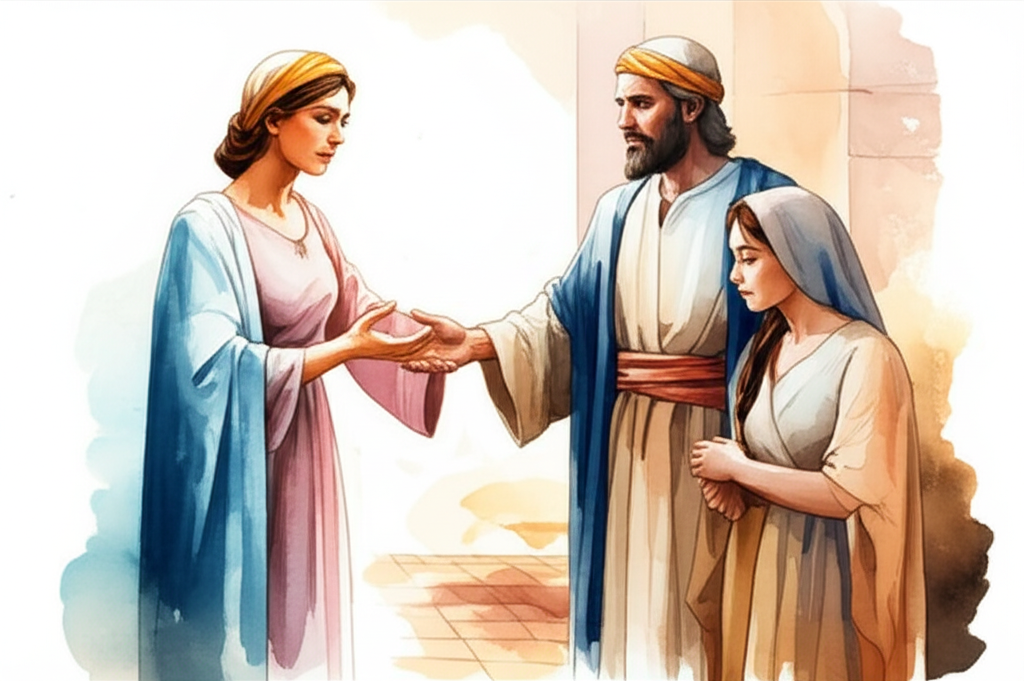
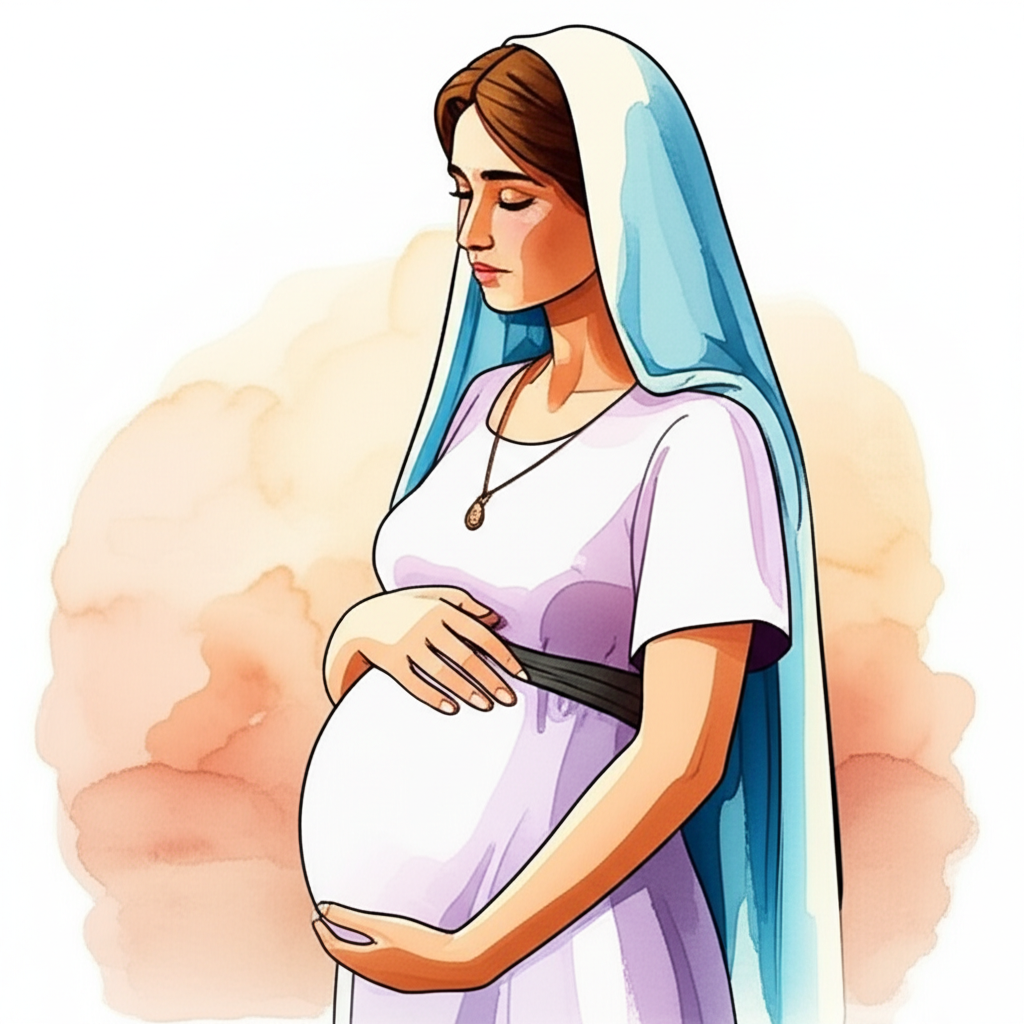

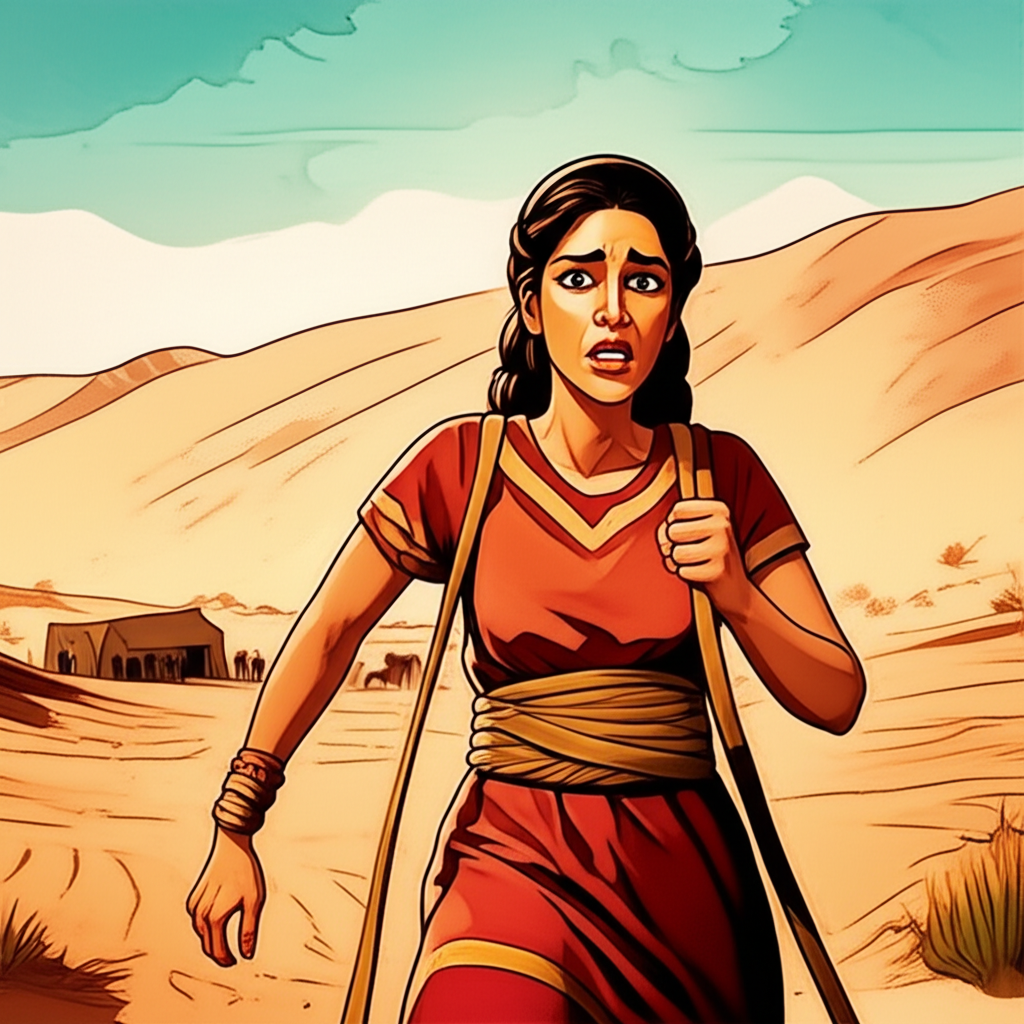


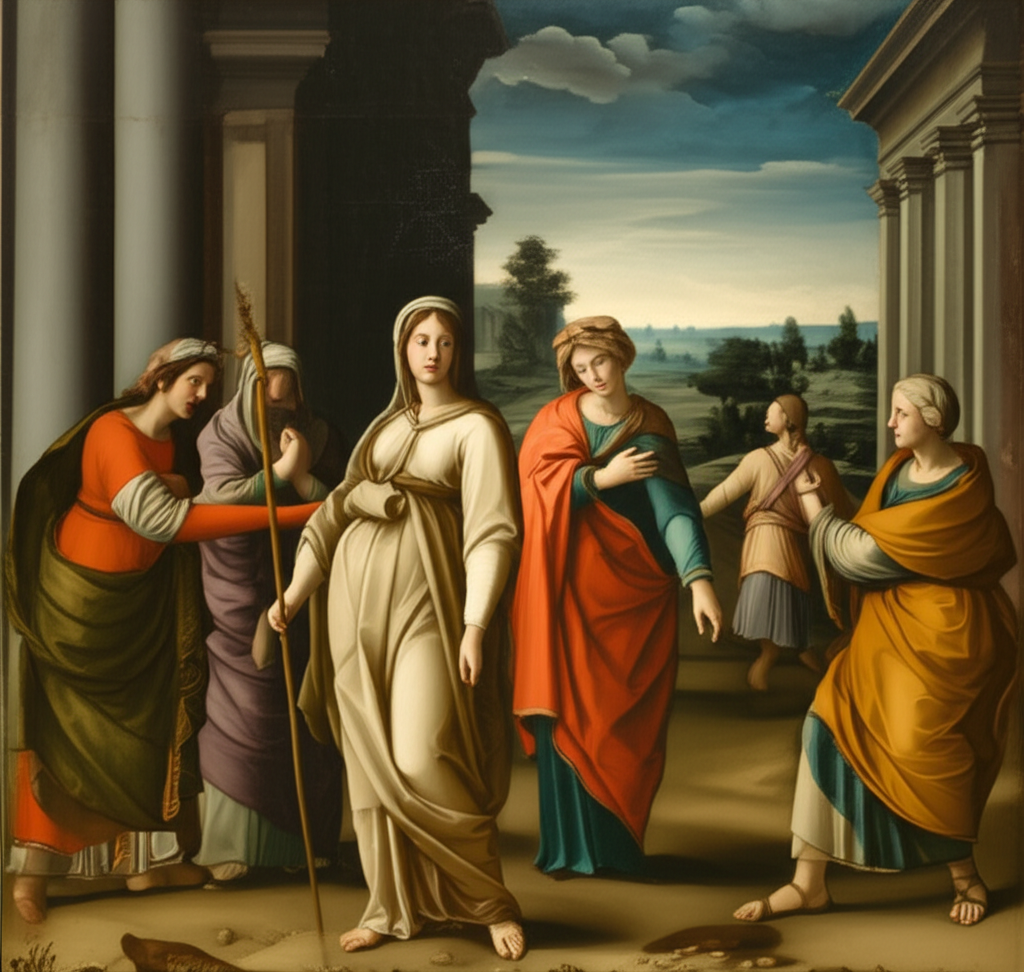
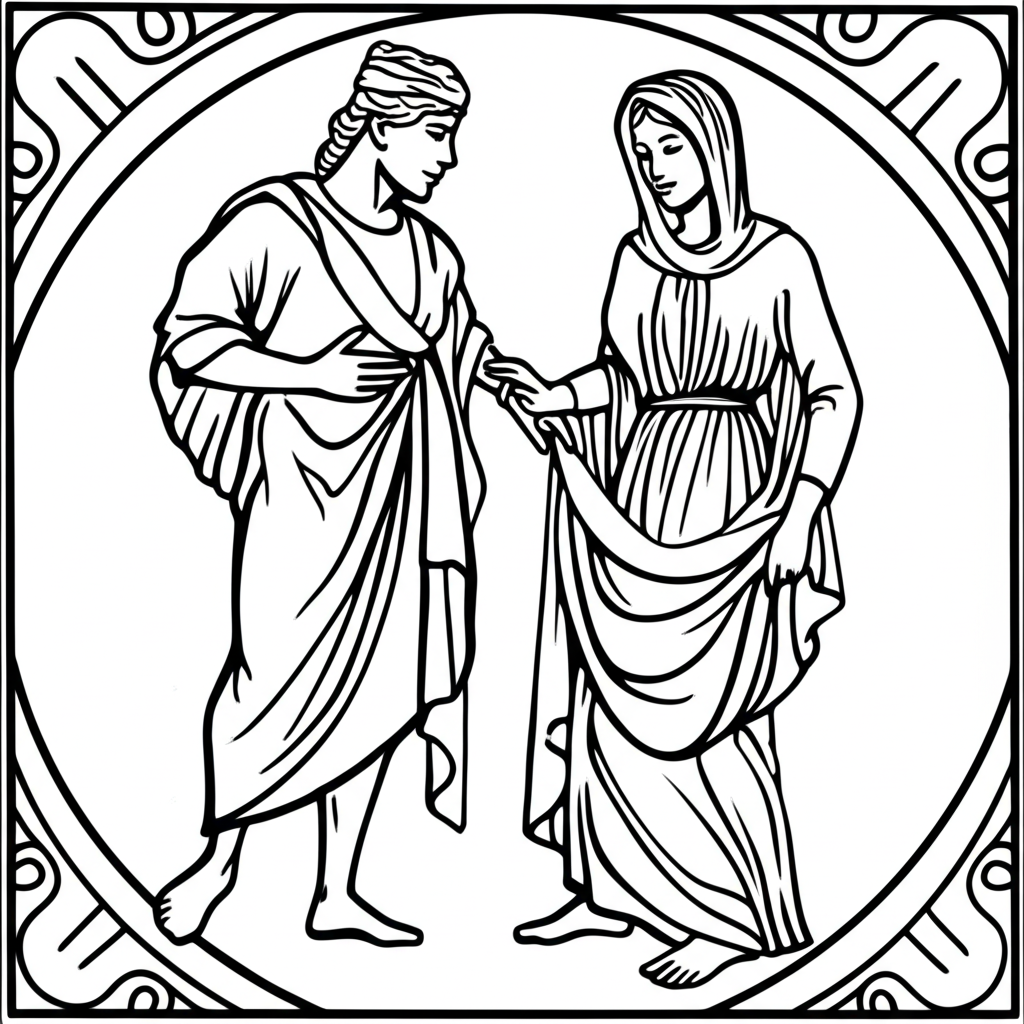
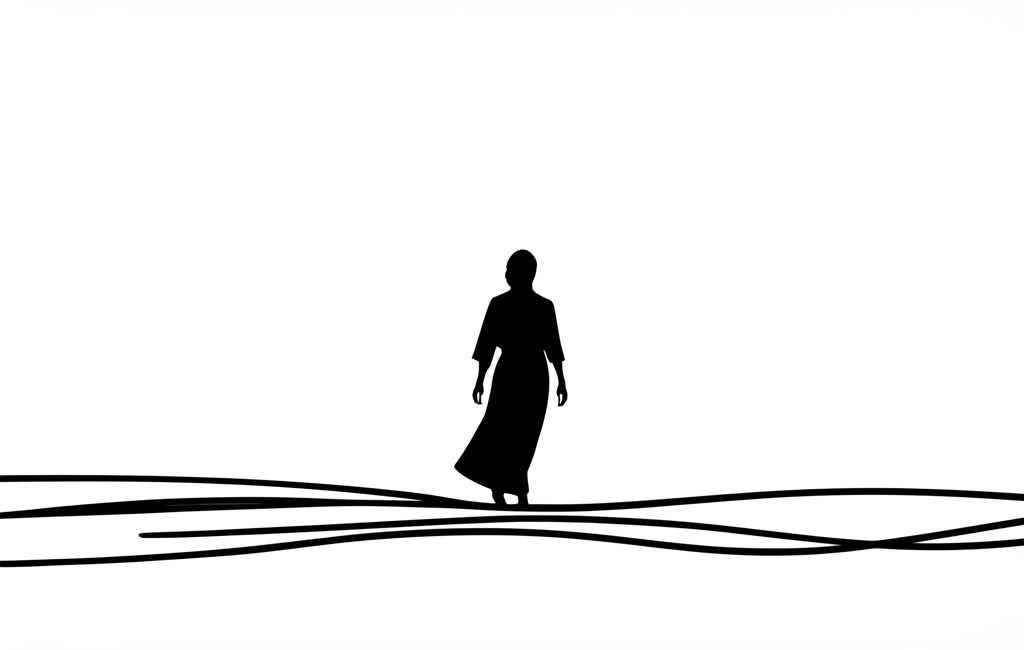
Genesis chapter 16 kjv
- 1 Now Sarai Abram's wife bare him no children: and she had an handmaid, an Egyptian, whose name was Hagar.
- 2 And Sarai said unto Abram, Behold now, the LORD hath restrained me from bearing: I pray thee, go in unto my maid; it may be that I may obtain children by her. And Abram hearkened to the voice of Sarai.
- 3 And Sarai Abram's wife took Hagar her maid the Egyptian, after Abram had dwelt ten years in the land of Canaan, and gave her to her husband Abram to be his wife.
- 4 And he went in unto Hagar, and she conceived: and when she saw that she had conceived, her mistress was despised in her eyes.
- 5 And Sarai said unto Abram, My wrong be upon thee: I have given my maid into thy bosom; and when she saw that she had conceived, I was despised in her eyes: the LORD judge between me and thee.
- 6 But Abram said unto Sarai, Behold, thy maid is in thine hand; do to her as it pleaseth thee. And when Sarai dealt hardly with her, she fled from her face.
- 7 And the angel of the LORD found her by a fountain of water in the wilderness, by the fountain in the way to Shur.
- 8 And he said, Hagar, Sarai's maid, whence camest thou? and whither wilt thou go? And she said, I flee from the face of my mistress Sarai.
- 9 And the angel of the LORD said unto her, Return to thy mistress, and submit thyself under her hands.
- 10 And the angel of the LORD said unto her, I will multiply thy seed exceedingly, that it shall not be numbered for multitude.
- 11 And the angel of the LORD said unto her, Behold, thou art with child and shalt bear a son, and shalt call his name Ishmael; because the LORD hath heard thy affliction.
- 12 And he will be a wild man; his hand will be against every man, and every man's hand against him; and he shall dwell in the presence of all his brethren.
- 13 And she called the name of the LORD that spake unto her, Thou God seest me: for she said, Have I also here looked after him that seeth me?
- 14 Wherefore the well was called Beerlahairoi; behold, it is between Kadesh and Bered.
- 15 And Hagar bare Abram a son: and Abram called his son's name, which Hagar bare, Ishmael.
- 16 And Abram was fourscore and six years old, when Hagar bare Ishmael to Abram.
Genesis chapter 16 nkjv
- 1 Now Sarai, Abram's wife, had borne him no children. And she had an Egyptian maidservant whose name was Hagar.
- 2 So Sarai said to Abram, "See now, the LORD has restrained me from bearing children. Please, go in to my maid; perhaps I shall obtain children by her." And Abram heeded the voice of Sarai.
- 3 Then Sarai, Abram's wife, took Hagar her maid, the Egyptian, and gave her to her husband Abram to be his wife, after Abram had dwelt ten years in the land of Canaan.
- 4 So he went in to Hagar, and she conceived. And when she saw that she had conceived, her mistress became despised in her eyes.
- 5 Then Sarai said to Abram, "My wrong be upon you! I gave my maid into your embrace; and when she saw that she had conceived, I became despised in her eyes. The LORD judge between you and me."
- 6 So Abram said to Sarai, "Indeed your maid is in your hand; do to her as you please." And when Sarai dealt harshly with her, she fled from her presence.
- 7 Now the Angel of the LORD found her by a spring of water in the wilderness, by the spring on the way to Shur.
- 8 And He said, "Hagar, Sarai's maid, where have you come from, and where are you going?" She said, "I am fleeing from the presence of my mistress Sarai."
- 9 The Angel of the LORD said to her, "Return to your mistress, and submit yourself under her hand."
- 10 Then the Angel of the LORD said to her, "I will multiply your descendants exceedingly, so that they shall not be counted for multitude."
- 11 And the Angel of the LORD said to her: "Behold, you are with child, And you shall bear a son. You shall call his name Ishmael, Because the LORD has heard your affliction.
- 12 He shall be a wild man; His hand shall be against every man, And every man's hand against him. And he shall dwell in the presence of all his brethren."
- 13 Then she called the name of the LORD who spoke to her, You-Are-the-God-Who-Sees; for she said, "Have I also here seen Him who sees me?"
- 14 Therefore the well was called Beer Lahai Roi; observe, it is between Kadesh and Bered.
- 15 So Hagar bore Abram a son; and Abram named his son, whom Hagar bore, Ishmael.
- 16 Abram was eighty-six years old when Hagar bore Ishmael to Abram.
Genesis chapter 16 niv
- 1 Now Sarai, Abram's wife, had borne him no children. But she had an Egyptian slave named Hagar;
- 2 so she said to Abram, "The LORD has kept me from having children. Go, sleep with my slave; perhaps I can build a family through her." Abram agreed to what Sarai said.
- 3 So after Abram had been living in Canaan ten years, Sarai his wife took her Egyptian slave Hagar and gave her to her husband to be his wife.
- 4 He slept with Hagar, and she conceived. When she knew she was pregnant, she began to despise her mistress.
- 5 Then Sarai said to Abram, "You are responsible for the wrong I am suffering. I put my slave in your arms, and now that she knows she is pregnant, she despises me. May the LORD judge between you and me."
- 6 "Your slave is in your hands," Abram said. "Do with her whatever you think best." Then Sarai mistreated Hagar; so she fled from her.
- 7 The angel of the LORD found Hagar near a spring in the desert; it was the spring that is beside the road to Shur.
- 8 And he said, "Hagar, slave of Sarai, where have you come from, and where are you going?" "I'm running away from my mistress Sarai," she answered.
- 9 Then the angel of the LORD told her, "Go back to your mistress and submit to her."
- 10 The angel added, "I will increase your descendants so much that they will be too numerous to count."
- 11 The angel of the LORD also said to her: "You are now pregnant and you will give birth to a son. You shall name him Ishmael, for the LORD has heard of your misery.
- 12 He will be a wild donkey of a man; his hand will be against everyone and everyone's hand against him, and he will live in hostility toward all his brothers."
- 13 She gave this name to the LORD who spoke to her: "You are the God who sees me," for she said, "I have now seen the One who sees me."
- 14 That is why the well was called Beer Lahai Roi; it is still there, between Kadesh and Bered.
- 15 So Hagar bore Abram a son, and Abram gave the name Ishmael to the son she had borne.
- 16 Abram was eighty-six years old when Hagar bore him Ishmael.
Genesis chapter 16 esv
- 1 Now Sarai, Abram's wife, had borne him no children. She had a female Egyptian servant whose name was Hagar.
- 2 And Sarai said to Abram, "Behold now, the LORD has prevented me from bearing children. Go in to my servant; it may be that I shall obtain children by her." And Abram listened to the voice of Sarai.
- 3 So, after Abram had lived ten years in the land of Canaan, Sarai, Abram's wife, took Hagar the Egyptian, her servant, and gave her to Abram her husband as a wife.
- 4 And he went in to Hagar, and she conceived. And when she saw that she had conceived, she looked with contempt on her mistress.
- 5 And Sarai said to Abram, "May the wrong done to me be on you! I gave my servant to your embrace, and when she saw that she had conceived, she looked on me with contempt. May the LORD judge between you and me!"
- 6 But Abram said to Sarai, "Behold, your servant is in your power; do to her as you please." Then Sarai dealt harshly with her, and she fled from her.
- 7 The angel of the LORD found her by a spring of water in the wilderness, the spring on the way to Shur.
- 8 And he said, "Hagar, servant of Sarai, where have you come from and where are you going?" She said, "I am fleeing from my mistress Sarai."
- 9 The angel of the LORD said to her, "Return to your mistress and submit to her."
- 10 The angel of the LORD also said to her, "I will surely multiply your offspring so that they cannot be numbered for multitude."
- 11 And the angel of the LORD said to her, "Behold, you are pregnant and shall bear a son. You shall call his name Ishmael, because the LORD has listened to your affliction.
- 12 He shall be a wild donkey of a man, his hand against everyone and everyone's hand against him, and he shall dwell over against all his kinsmen."
- 13 So she called the name of the LORD who spoke to her, "You are a God of seeing," for she said, "Truly here I have seen him who looks after me."
- 14 Therefore the well was called Beer-lahai-roi; it lies between Kadesh and Bered.
- 15 And Hagar bore Abram a son, and Abram called the name of his son, whom Hagar bore, Ishmael.
- 16 Abram was eighty-six years old when Hagar bore Ishmael to Abram.
Genesis chapter 16 nlt
- 1 Now Sarai, Abram's wife, had not been able to bear children for him. But she had an Egyptian servant named Hagar.
- 2 So Sarai said to Abram, "The LORD has prevented me from having children. Go and sleep with my servant. Perhaps I can have children through her." And Abram agreed with Sarai's proposal.
- 3 So Sarai, Abram's wife, took Hagar the Egyptian servant and gave her to Abram as a wife. (This happened ten years after Abram had settled in the land of Canaan.)
- 4 So Abram had sexual relations with Hagar, and she became pregnant. But when Hagar knew she was pregnant, she began to treat her mistress, Sarai, with contempt.
- 5 Then Sarai said to Abram, "This is all your fault! I put my servant into your arms, but now that she's pregnant she treats me with contempt. The LORD will show who's wrong ? you or me!"
- 6 Abram replied, "Look, she is your servant, so deal with her as you see fit." Then Sarai treated Hagar so harshly that she finally ran away.
- 7 The angel of the LORD found Hagar beside a spring of water in the wilderness, along the road to Shur.
- 8 The angel said to her, "Hagar, Sarai's servant, where have you come from, and where are you going?" "I'm running away from my mistress, Sarai," she replied.
- 9 The angel of the LORD said to her, "Return to your mistress, and submit to her authority."
- 10 Then he added, "I will give you more descendants than you can count."
- 11 And the angel also said, "You are now pregnant and will give birth to a son. You are to name him Ishmael (which means 'God hears'), for the LORD has heard your cry of distress.
- 12 This son of yours will be a wild man, as untamed as a wild donkey! He will raise his fist against everyone, and everyone will be against him. Yes, he will live in open hostility against all his relatives."
- 13 Thereafter, Hagar used another name to refer to the LORD, who had spoken to her. She said, "You are the God who sees me." She also said, "Have I truly seen the One who sees me?"
- 14 So that well was named Beer-lahai-roi (which means "well of the Living One who sees me"). It can still be found between Kadesh and Bered.
- 15 So Hagar gave Abram a son, and Abram named him Ishmael.
- 16 Abram was eighty-six years old when Ishmael was born.
- Bible Book of Genesis
- 1 The beginning
- 2 Adam and Eve
- 3 The Fall of Man
- 4 Cain and Abel
- 5 Adam to Noah
- 6 Noah and the flood
- 7 The great flood
- 8 Seed time and harvest time
- 9 Rainbow covenant and Sons of Noah
- 10 Noah's sons
- 11 The Tower of Babel
- 12 Story of Abraham
- 13 Abraham and Lot
- 14 Melchizedek blesses Abraham
- 15 Abrahamic covenant ceremony
- 16 Abraham's Ishmael by Hagar
- 17 Abram circumcision
- 18 Abraham and the three angels
- 19 Sodom and gomorrah
- 20 Abraham Deceives Abimelech
- 21 Abraham's Issac by Sarah
- 22 Abraham sacrificing Isaac
- 23 Sarah's Death and Burial
- 24 Rebekah and Isaac
- 25 Jacob and Esau
- 26 God's Promise to Isaac
- 27 Jacob deceives Isaac
- 28 Jacob's dream at Bethel
- 29 Jacob Rachel Leah
- 30 Jacob's Prosperity
- 31 Jacob flees from Laban
- 32 Jacob wrestles with god's angel
- 33 Jacob and Esau reconcile
- 34 Defiling of Dinah
- 35 12 sons of Jacob
- 36 Esau descendants the edomites
- 37 Dreams of Joseph the dreamer
- 38 Onan Tamar and Judah
- 39 Joseph and Potiphar's wife
- 40 Dreams of Pharaoh's servants
- 41 Joseph interprets dreams of Pharaoh
- 42 Joseph in egypt
- 43 Joseph and Benjamin
- 44 Joseph tests his brothers
- 45 Joseph reveals his identity
- 46 Jacob family tree bible
- 47 Famine and Jacob in Goshen
- 48 Ephraim and Manasseh
- 49 Jacob blesses his 12 sons
- 50 Joseph and Jacob buried